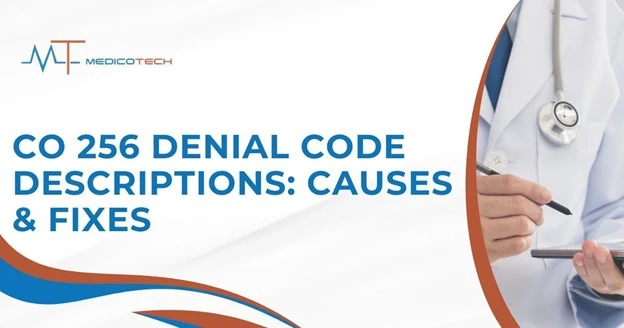Accurate and prompt payment is very important to healthcare providers in medical billing and coding. Still, making sense of denial codes is often not an easy job. A denial code that regularly raises confusion is the CO 16 Denial Code. The code usually marks problems with the information given, which may cause the claim to be rejected and payment to be postponed.
Facing a CO 16 denial means you must know what it is and how to go about fixing it. What’s helpful is that with the correct information, resolving CO 16 denials and avoiding them down the line is possible. We’ll go over each aspect of CO 16 in this article, starting with why denials happen and moving on to how you can overcome and avoid them for more efficient billing.
What is CO 16 Denial Code?
Definition and Meaning
The CO 16 Denial Code is a denial issued by health insurance companies when a claim is rejected due to missing or invalid claim information. Specifically, the denial code indicates that the payer (the insurance company) is unable to process the claim because of incorrect or incomplete details, such as incorrect patient information, unsubmitted or erroneous documentation, or improper coding.
This denial is commonly seen with Medicare and other private payers and is a common issue that providers must address in order to receive payment for services rendered.
Why Claims Get Denied with CO 16
There are several reasons why a claim might be denied with the CO 16 denial code. Understanding these reasons can help you identify and correct the issue promptly.
Missing or Invalid Claim Information
One of the most frequent causes of CO 16 denials is the presence of missing or invalid claim information. This could include missing patient details, such as the patient’s name, insurance information, or medical record number. It can also occur if key information such as the procedure codes (CPT or HCPCS codes) is incorrect, missing, or incomplete.
Duplicate Claims
CO 16 may also be issued if the insurance payer identifies duplicate claims. This happens when a claim for the same service is submitted multiple times, resulting in confusion about which claim should be processed and paid. In such cases, the payer may deny the claim under the CO 16 code.
Incorrect Service Dates
Another common reason for CO 16 denials is incorrect service dates. If the dates of service provided on the claim don’t match those on the payer’s records or are entered incorrectly (e.g., the wrong month or year), the claim can be denied with a CO 16 code.
Non-Covered Services
The CO 16 Denial Code may also occur if the service provided is not covered by the payer’s plan. For instance, certain treatments, procedures, or diagnoses may not be included in a patient’s plan benefits, leading to the claim being denied due to non-coverage.
Common Reasons for CO 16 Denial
To better understand the causes of CO 16 denials, let’s dive into some of the most common mistakes and issues that lead to this denial.
1. Missing or Invalid Claim Information
Inaccurate or incomplete information is one of the leading reasons for CO 16 denials. Providers must ensure that every claim is submitted with accurate and complete information, including:
- Patient details: Name, date of birth, insurance details
- Billing provider information: National Provider Identifier (NPI), address
- Procedure codes: Correct CPT or HCPCS codes
- Diagnosis codes: Appropriate ICD codes
2. Duplicate Claims
Insurance payers often flag duplicate claims if they receive identical information submitted multiple times. This typically happens when:
- A claim is mistakenly resubmitted.
- Claims are submitted by both the provider’s office and an outside service (e.g., laboratory or imaging center).
Providers should always check for duplicates in the billing process and verify that a claim has not already been submitted.
3. Incorrect Service Dates
When submitting claims, the dates of service must align with the payer’s records. Errors like submitting an incorrect date or listing a service date outside the coverage period can trigger a CO 16 denial.
4. Non-Covered Services
Healthcare services that are not covered by a patient’s insurance plan will lead to a CO 16 denial. This can include services that:
- Are deemed experimental or investigational.
- Are outside the scope of benefits covered by the insurance plan.
Understanding the limitations of the patient’s policy is crucial to prevent these denials.
How to Resolve CO 16 Denials
Steps to Correct Errors
If you’ve received a CO 16 denial code, it’s time to correct the error and resubmit the claim. Here’s a step-by-step guide to resolve this issue:
- Review the Denial Notice: Start by carefully reviewing the denial notice to identify the exact reason for the rejection. The payer will often include detailed information about why the claim was denied.
- Identify the Cause: Determine the cause of the denial. Is it missing information, duplicate submission, incorrect codes, or something else? Understanding the cause is the first step in resolving the issue.
- Correct the Information: Once the issue has been identified, update the claim. Ensure all patient and provider details are accurate, that the service dates match, and the correct codes are used. If you’re dealing with duplicate claims, remove the duplicate submission and ensure only one claim is being processed.
- Submit Documentation: In some cases, additional documentation may be required to support the claim. Ensure you include any necessary documentation, such as medical records, referral letters, or pre-authorizations, to prevent further delays.
- Resubmit the Claim: After making the necessary corrections and adding any required documentation, resubmit the claim for processing.
Documentation Requirements
Depending on the nature of the claim, you may need to submit additional documentation. This could include:
- Medical records that demonstrate medical necessity.
- Provider notes for services rendered.
- Referral or authorization documents if the service requires prior approval.
Ensure that all documentation is thorough, accurate, and up to date.
How to Appeal
If your resubmission is also denied, you may need to file an appeal. This involves:
- Reading the payer’s appeal instructions: Payers often provide guidelines for submitting an appeal, including any documentation required.
- Providing additional evidence: Submit any additional documents that support the claim.
- Be clear and concise: Clearly outline why the claim should be covered, referencing relevant codes, policies, and the patient’s medical history.
Preventing CO 16 Denials in the Future
Prevention is always better than dealing with denials after they happen. Here are some best practices for effective point of care documentation to avoid CO 16 denials in the future:
Best Practices for Accurate Billing
- Ensure Accurate Data Entry: Double-check all patient and provider details to avoid errors.
- Use Correct Codes: Ensure that CPT, ICD, and HCPCS codes are entered correctly.
- Verify Service Dates: Always check that the dates of service are accurate and match the payer’s records.
Common Mistakes to Avoid
- Submitting incomplete claims: Never submit a claim without verifying that all required fields are filled in.
- Not checking for duplicates: Always check the payer’s system to ensure the claim hasn’t already been processed.
- Ignoring payer policies: Different payers have varying policies on coverage. Familiarize yourself with each payer’s guidelines.
CO 16 vs. Other Denial Codes
Comparison with Similar Codes (e.g., CO 18, CO 22)
It’s important to distinguish between CO 16 and other denial codes like CO 18 and CO 22, which can often lead to confusion.
- CO 18: This code indicates duplicate claims and can sometimes be mistaken for CO 16. It’s important to identify the specific issue — whether it’s a missing or incorrect detail or an actual duplicate submission.
- CO 22: This code is used when a service is not covered by the patient’s insurance plan. If the patient’s policy doesn’t cover the service, CO 22 will be issued instead of CO 16.
FAQs on CO 16 Denial Code
Can CO 16 be appealed?
Yes, CO 16 denials can be appealed. If you believe the denial was made in error or that the claim was submitted with the correct information, you can file an appeal with the payer. Make sure to provide all necessary documentation to support your case.
Who issues CO 16 denials (Medicare, private payers)?
CO 16 denials can be issued by both Medicare and private payers. Whether you’re dealing with a government-funded plan or a commercial insurance provider, the process of resolving CO 16 denials is similar. However, the exact requirements for documentation and appeal procedures may vary by insurer.




